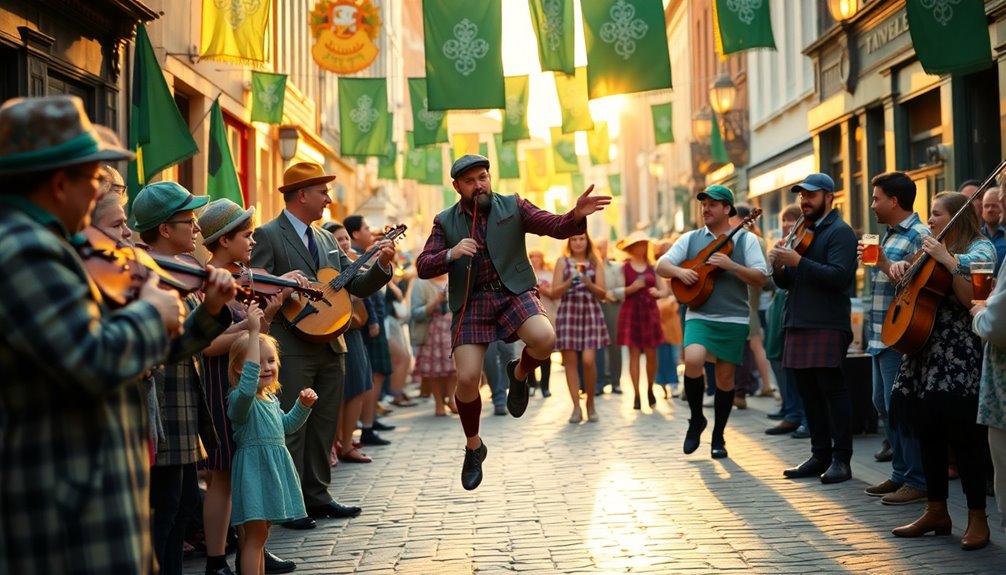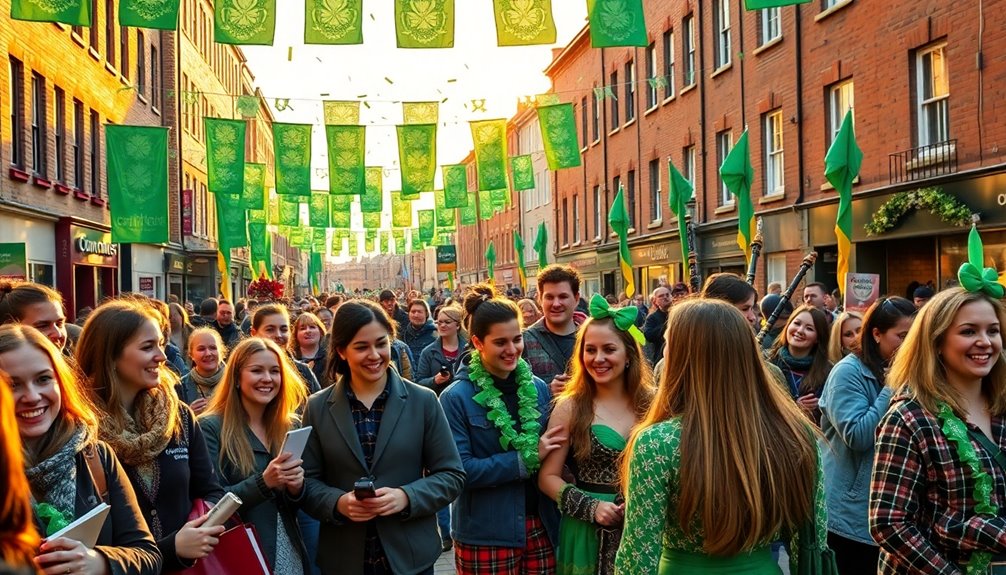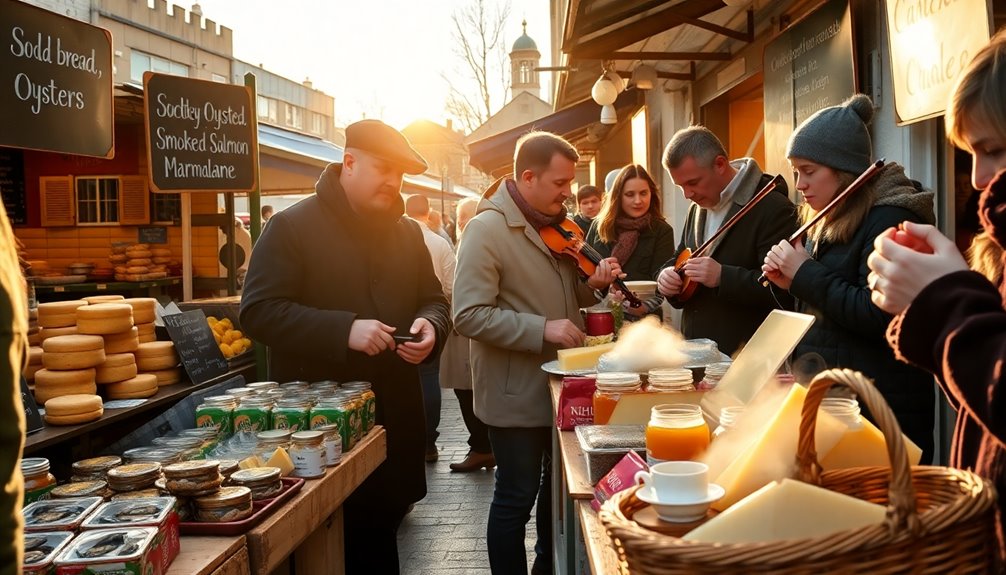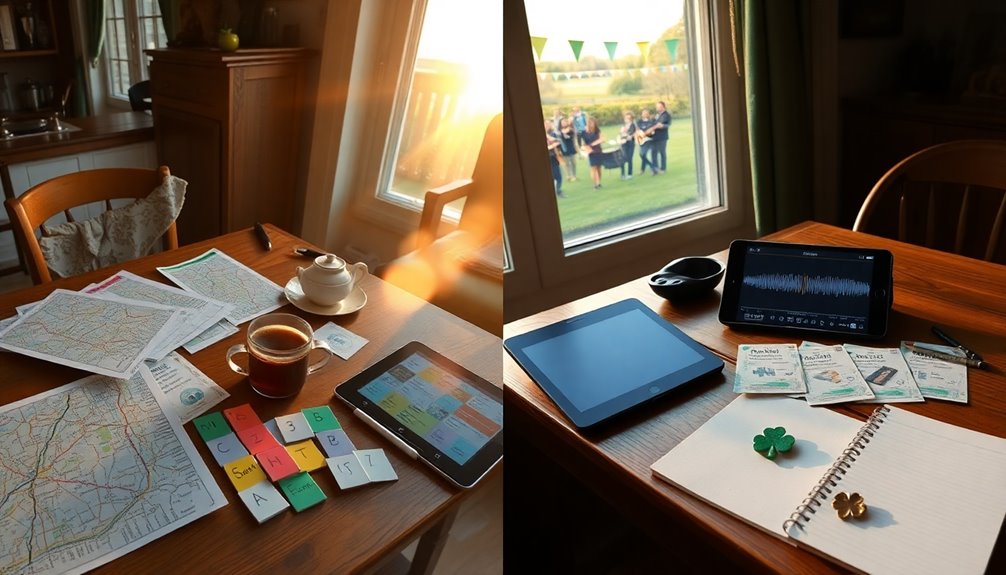
You can learn English at Irish festivals by diving into music, storytelling and market chat where everyday phrases and local idioms live. Aim specific goals—listening to sean-nós songs, practicing market bargaining, or joining céilí dances—and pick events that match them. Start conversations with compliments or curious questions, volunteer to boost talk time, and jot down colorful expressions in a journal or vlog. Practice lyrics and role-play workshop phrases, and keep exploring these lively scenes to pick up more.
Highlights
- Set clear goals (listening, slang, conversation) and choose festival events that target those specific skills.
- Learn songs and sing along at sessions to improve pronunciation, rhythm, and idiomatic expressions.
- Use markets, food stalls, and tours for practical transactional phrases and everyday vocabulary.
- Start friendly conversations with locals—ask about customs, favorites, and stories to practice natural speech.
- Keep a journal or vlog of phrases, place-names, and moments to reinforce memory and track progress.
Why Irish Festivals Are Ideal for Learning English
Because festivals bring language to life, you’ll find Irish celebrations are perfect places to learn English: they mix storytelling, music, and everyday conversation in settings where locals are relaxed and generous with speech. You’ll taste cultural immersion firsthand — ceilí dances, market banter, and pub tales teach colloquialisms and rhythm. You can join a language exchange under fairy-lit arches, trading phrases with hosts who value warmth and wit. Traditions frame vocabulary in memorable scenes, so idioms stick. You’ll feel free to experiment, make mistakes, and grow your voice among welcoming people who prize story, song, and shared laughter.
Planning Your Festival Language Goals
Decide what you want to achieve — whether it’s improving listening, picking up regional expressions, or practicing conversation — and keep those aims realistic for a festival setting. Then match those goals to specific events, like storytelling sessions for vocabulary or céilí dances for conversational rhythm and idioms. That way you’ll learn with purpose while soaking up the traditions around you.
Set Clear Language Aims
When you plan your festival visits, set concrete language aims so each céilí and parade becomes purposeful practice; think about the skills you want to sharpen—listening for regional accents at a music session, learning ten festival-specific phrases, or confidently ordering food and asking about traditions—and schedule short, measurable steps you can follow during the day. Decide what language motivation drives you: fluency for travel, chat with locals, or cultural insight. Use clear goal setting—micro-tasks like a five-minute vocab drill before a gig, one question to ask an elder, or noting three new idioms—so your freedom to explore stays focused and fruitful.
Match Festival Activities
Anyone can turn a festival itinerary into a targeted language plan by matching activities to specific skills: pick music sessions to tune your ear to accents, storytelling nights to practise narrative phrases, food stalls to drill transactional language, and craft workshops to learn vocabulary tied to tradition. Then choose festival crafts for hands-on terms, and join culinary workshops to master food-related speech. You’ll set bite-sized goals—ask vendors three questions, retell a tale, describe a craft step—so you roam freely yet focus. Respect local idioms and customs, listen before leaping in, and let each event sharpen a different communicative muscle.
Popular Irish Festivals to Attend for English Practice

While soaking up the music, stories and warm banter at a festival, you’ll find more chances to practice English than in a classroom—particularly at Ireland’s best-loved events where traditions shape the conversation. Choose Galway Arts for creative exchanges and cultural immersion amid street theatre and poetry; head to Fleadh Cheoil for song, dance and festival traditions that teach idioms and local humour; visit St. Patrick’s Day parades to absorb national pride language; or try a smaller harvest fair to hear rural accents and ancestral tales. Each offers freedom to listen, join in and learn through living culture.
Engaging With Locals: Conversation Starters
Looking to strike up a friendly chat at a festival? You can open with curiosity: ask about local customs or which events are unmissable. Compliment a performer or costume, then pivot: “What’s your favorite foods here?” or “Any tips for a newcomer?” Use light idioms—”mind if I join?”—and mirror warmth. Listen for stories about music, dance, or family traditions; they’ll teach vocabulary and tone. Keep questions open, respectful, and playful so folks share memories. You’ll gain language and freedom to explore community life, learning phrases that fit real moments rather than classroom scripts.
Volunteer Opportunities That Build Language Skills
If striking up chats teaches you everyday phrases and local stories, volunteering at a festival lets you practice those words in repeatable, meaningful ways. You’ll join tasks—stewarding, ticketing, or welcoming—that force clear, polite speech and friendly idioms. The volunteering benefits go beyond vocabulary: you’ll learn timing, tone, and cultural cues while contributing to community engagement. Traditions become lessons as elders guide parades and craftspeople explain techniques; you’ll ask questions, give directions, and tell jokes, gaining fluidity and confidence. If you crave freedom to explore language, volunteering offers purposeful practice within living Irish customs and warm local rhythms.
Using Music and Song to Improve Listening Comprehension
When you listen to festival tunes, work on learning the lyrics actively so traditional phrases and local idioms start to stick. Sing along regularly—whether at a ceili or by yourself—to sharpen rhythm, pronunciation, and your ear for natural speech. Try different genres from sean-nós to modern folk to catch regional accents and varied vocabulary.
Learn Lyrics Actively
Because songs are woven into Irish festivals as naturally as conversation, using music to learn English gives you real-world listening practice and cultural insight at the same time. You’ll do lyric analysis line by line, noting idioms, dialect, and historical references that anchor meaning. Pause, replay, and map unknown words to images or stories so you keep an emotional connection to phrases. Track recurring motifs — sea, home, hearth — to build vocabulary tied to tradition. This method lets you learn with freedom: choose songs that move you, study them deliberately, and absorb language through culture, not drills.
Sing Along Regularly
Having broken down lyrics for meaning, you should start singing along regularly to turn passive understanding into active listening. Embrace traditional Irish refrains and local phrasing while you practice singing techniques that boost rhythm and pronunciation. Let lyric interpretation guide timing and emotion so you don’t just mimic words but feel them. Sing with friends at céilís or alone on walks; freedom in voice helps you internalize idioms and pronunciation. Record yourself, compare, and adjust. Over time your ear will pick up subtle vowels, dropped consonants, and cadence native speakers use, sharpening comprehension through joyful, disciplined repetition.
Explore Musical Genres
Although you might stick to ballads at first, branching into different Irish musical genres—traditional sean-nós, folk, rebel songs, contemporary indie, and even trad-pop hybrids—will train your ear for a wider range of accents, rhythms, and idiomatic phrasing. You’ll explore folk music with traditional instruments, note how contemporary genres remix old forms, and watch genre evolution live at festival performances. Use festival playlists to map song interpretations, follow musical collaborations to see language shift, and tap into dance rhythms to pick up natural stress and timing. Embrace cultural significance; listening freely builds fluent, confident comprehension.
Dance, Drama, and Role-Play for Speaking Confidence
When you join an Irish céilí, community play, or a simple role-play exercise, you’ll find speaking practice wrapped in rhythm, story, and shared habit — exactly the kind of cultural scaffolding that makes language stick. You’ll use dance techniques to loosen your tongue and body, letting idioms land naturally as you move. Drama improvisation in local plays pushes you to react in the moment, choosing words that feel honest. Role play scenarios at workshops mirror real conversations — greetings, bargaining, storytelling — and serve as confidence building tools. You’ll leave freer, fluent, and more rooted in living tradition.
Food, Markets, and Everyday Vocabulary Practice

Markets are where language and life meet: you’ll learn everyday English through smells, bargaining, and the routine of buying bread or a mug of tea. You’ll wander stalls, pick up food vocabulary — words for cheese, soda bread, or smoked salmon — and practise market expressions like “How much is this?” and “Any fresh ones today?” Listen to vendors’ local turns of phrase, haggle gently, and savour idioms tied to season and harvest. This hands-on, tradition-rich practice frees you to speak naturally, build confidence, and weave English into daily routines without fear.
Guided Tours and Storytelling Sessions for Vocabulary Expansion
Because stories carry place and speech together, joining a guided tour or a storytelling session is one of the best ways you’ll expand vocabulary tied to people, places, and the past; guides and seanchaí (traditional storytellers) sprinkle local idioms, place-names, and everyday phrases into tales of saints, rebellions, or harvests, so you hear language in context and learn how words are really used. You’ll move freely through lanes, hear pronunciations, and pick up colloquial turns. Ask questions, note gestures, repeat phrases aloud. These guided tours and storytelling sessions give you living vocabulary—words that open maps, memories, and the local way of being.
Workshops and Classes Offered at Festivals
You’ll find short conversational workshops that let you practice everyday English in friendly, low-pressure settings. Traditional music classes teach song lyrics, rhythm, and cultural phrases so language learning comes with a tune and a story. Interactive language-immersion games tie it all together, turning vocabulary and idioms into playful, memorable practice.
Short Conversational Workshops
When you wander into a festival hall or a cosy tent, you’ll often find short conversational workshops designed to get you speaking Irish in real-life situations; these sessions usually focus on greetings, storytelling phrases, and everyday idioms tied to the festival’s traditions. You’ll join small groups, try prompts, and practice free-form replies that echo local customs. Facilitators encourage a relaxed language exchange, nudging you toward natural rhythm and regional turns of phrase. You’ll pick up useful idioms tied to dancing, food, and greetings, gaining confidence to roam, chat, and celebrate with new friends without feeling tethered to textbooks.
Traditional Music Classes
Anyone can slip into a fiddle or bodhrán class at a festival and find language learning woven into the tunes—these traditional music workshops teach rhythms, song phrases, and call-and-response patterns that mirror spoken Irish idioms and conversational cadence. You’ll pick up vocabulary as you learn tunes on traditional instruments, mimic phrasing, and trade short storytelling lines between sets. Instructors explain cultural significance of songs and encourage improvisation, so you can experiment with speech and slang in a safe space. If you crave freedom in learning, these classes let you move, listen, and speak naturally while honoring tradition.
Language Immersion Games
From learning a reel’s call-and-response to practicing storytelling lines, festivals also offer language immersion games that turn play into practical practice. You’ll join language games rooted in local tradition—word-chase, phrase-swapping, storytelling circles—designed as immersion activities that respect dialect and timing. You can improvise lines in an open-air workshop, mimic a seanchaí’s cadence, or trade idioms during a scavenger hunt through lanes and pubs. These sessions free you to experiment, make mistakes, and borrow expressions locals treasure. By playing, you pick up vocabulary, rhythm, and cultural nuance without feeling staged or confined.
Making the Most of Informal Social Spaces
Although festival fields and snug pubs might seem noisy at first, they’re among the richest informal classrooms you’ll find for learning English through Irish traditions. You should lean into social dynamics: listen, mirror expressions, and join conversations about music, sport, or a pint. Embrace cultural exchange by offering your own stories and asking curious, open questions. Use local idioms gently; mimic rhythm and humour rather than translating literally. Move between groups, follow introductions, and accept invitations to sit and chat. You’ll gain fluency, confidence, and a sense of freedom while respecting customs and letting language grow naturally.
Documenting Your Experience: Journals and Vlogs
When you capture moments from céilís, parades, or quiet pub chats in a journal or vlog, you’re not just recording words but preserving the rhythm, humour, and small customs that give Irish English its colour. You’ll use journal prompts to note slang, turns of phrase, tunes, and smells; short entries keep it alive. For vlogs, employ simple vlog techniques: steady shots of dancers, snippets of banter, captions for idioms. Reflect on context—who said what and why—so your recordings respect tradition. You’ll build a portable language archive that feels free, authentic, and endlessly revisitable.
Preparing Before and Reflecting After Each Festival

After you’ve been jotting down moments in journals and clipping vlog highlights, take a little time before each festival to set clear learning goals and after it to reflect on what stuck. You’ll plan festival preparation: pick phrases to practise, cultural notes to notice, and role-play questions to ask locals. During events, stay curious but free—listen for idioms, savour stories, and record snippets. After, do a focused post festival reflection: review recordings, correct errors, and note surprising expressions. This ritual turns celebration into study without shackles, honouring tradition while expanding your spoken and cultural fluency.
Some Questions Answered
How Do I Find Cheap Festival Tickets as a Student?
Look for student discounts and festival promotions on official sites and campus noticeboards, and join mailing lists so you’ll snag early-bird deals. Use student ID apps, follow festival socials for flash promos, and buddy up to split costs on group passes. Embrace local traditions—volunteer at events for free entry, barter skills for tickets, and keep an adventurous, freedom-loving mindset to turn bargain-hunting into part of the festival experience.
Are Language Exchange Partners Available at All Festivals?
Not all festivals have language partners, but about 60% feature organized exchange activities, so you’ll often find them. You’ll mingle with locals through festival activities like céilí dances, storytelling sessions, and pub chats — traditions that loosen tongues. You’ll want to ask organizers or volunteer booths for language partner lists, join informal circles, and be ready to swap stories. You’ll enjoy freedom to practice, learn idioms, and savor cultural rhythm.
What Vaccinations or Health Precautions Are Recommended for Festival Travel?
You should check vaccination requirements for travel and make sure routine shots (tetanus, MMR) are up to date; consider flu and COVID boosters if packed events are likely. Carry proof of vaccination and a valid health insurance card or policy details. Bring basic first-aid supplies, any prescription meds, and sun or rain protection. Respect local traditions about care and keep flexible — freedom to roam is easier when your health precautions are sorted.
Can I Practice English if I Don’t Know Any Irish Gaelic?
Yes — you can. Think of English as an open harbor where ships of speech from every isle dock; language immersion will let you board any vessel. You’ll gain by joining ceilidhs, swapping stories, and embracing cultural exchange even if you don’t know Irish Gaelic. You’ll pick up idioms, traditions, and local rhythms by listening and chiming in. Don’t hold back — freedom in learning comes from participation and curiosity.
How Do I Handle Homesickness During Multi-Day Festivals?
You’ll cope by using simple homesickness remedies: keep familiar rituals, pack small comforts, and set regular calls home. Embrace festival coping through joining music sessions, sharing stories, and learning local customs—tradition eases longing. You’ll wander freely yet anchor yourself with routine: morning tea, a journal, or a familiar playlist. Let communal dances and friendly strangers remind you that belonging grows from shared moments, not just place.
Summing Everything Up
You’ve seen how festivals blend music, stories and banter to sharpen your English—so why not immerse yourself? Embrace traditions, learn the idioms that colour everyday speech, and let local warmth turn awkward stumbles into memorable chats. Volunteer, join workshops, keep a journal or vlog, and treat each ceilidh and conversation as practice. When you leave, you’ll not only know more words but carry a bit of Ireland’s hospitality with you.
